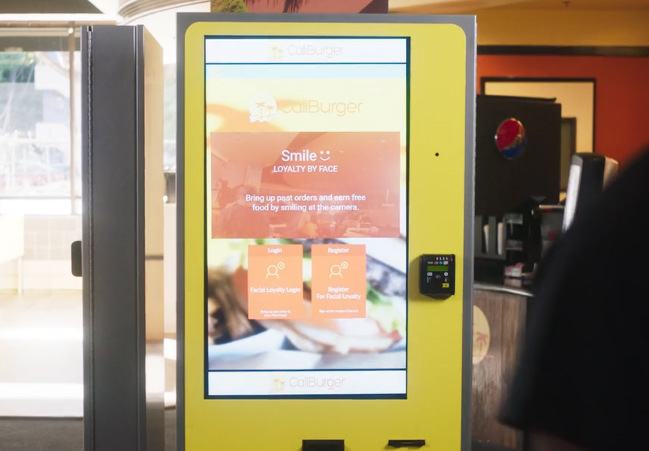Besides speeding up the ordering process, the kiosk could also eliminate the chaos that can ensue at the counter when trying to place an order with kids or a group of friends.
CaliBurger’s kiosk is now being demoed at its Pasadena store and if successful could be rolled out to its locations worldwide in 2018.
Here’s how it works: Customers first need to activate a so-called “loyalty account,” which is easily done with a few taps on the kiosk’s display, and then place their first order.
When you make a return visit, the kiosk will ask you to “bring up your past orders” (perhaps not the best phrase for a restaurant to use) “by smiling at the camera.”
It will then display your previous selections whereupon you can request the same food or go for something new. Multiple visits will also earn you loyalty points called “CaliCoins” that you can collect with another quick smile before spending on your next order.
Once you’re done, simply complete the payment at the kiosk and head over to the counter where your food will be waiting for you.
The next phase of the plan is to allow customers to “pay using their faces,” making the entire process even quicker.
“Our goal for 2018 is to replace credit card swipes with face-based payments,” the company said in a release. “Facial recognition is part of our broader strategy to enable the restaurant and retail industries to provide the same kinds of benefits and conveniences in the built world that customers experience with retailers like Amazon in the digital world.”
CaliBurger partnered with tech firm NEC Corporation of America to develop the facial recognition-enabled kiosk.
In a similar effort to make fast food even faster, KFC recently started testing a kiosk that scans your face so you can “smile to pay.” It’s another step toward a time when using cash, credits cards, and smartphones for payments will be a thing of the past, a time when a simple smile will allow us to make a purchase, though a grimace may feel more natural for some pricier items.



